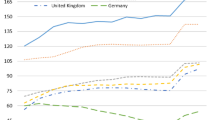Abstract
This paper examines the effect of a consumption tax on economic growth using an overlapping generations (OLG) model with money holdings. We show that the neutrality of the consumption tax does not hold in the money-in-the-utility-function model, because a change in consumption taxation induces the substitution of money holdings for consumption, and the money is the net wealth within the OLG structure. An increase in the consumption tax rate lowers (raises) the growth rate under a low (high) monetary expansion rate. On the other hand, in the cash-in-advance model and the money-in-the-production-function model, the neutrality of consumption taxation holds even within the OLG structure, because in these models there is no substitution of consumption and money holdings.
Similar content being viewed by others

References
Batina RG (1987) The consumption tax in the presence of altruistic cash and human capital bequests with endogenous fertility decisions. J Public Econ 34: 329–354
Batina RG, Ihori T (2000) Consumption tax policy and the taxation of capital income. Oxford University Press, New York
Blanchard OJ (1985) Debt, deficits, and finite horizons. J Polit Econ 93: 223–247
Chang W (2006) Relative wealth, consumption taxation, and economic growth. J Econ 88: 103–129
Futagami K, Doi J (2004) Commodity taxation and economic growth. Jpn Econ Rev 55: 46–55
Itaya J (1998) Money, neutrality of consumption taxes, and growth in intertemporal optimizing models. Jpn Econ Rev 49: 395–411
Lucas RE (1988) On the mechanics of economic development. J Monet Econ 22: 3–42
Matsuzaki D (2003) The effects of a consumption tax on effective demand under stagnation. Jpn Econ Rev 54: 101–118
Menchik PL, Martin D (1982) The incidence of a lifetime consumption tax. Natl Tax J 35: 189–203
Mino K, Shibata A (2000) Growth and welfare effects of monetary expansion in an overlapping generations model. Jpn Econ Rev 51: 407–430
Pecorino P (1993) Tax structure and growth in a model with human capital. J Public Econ 52: 251–271
Rebelo S (1991) Long-run policy analysis and long-run growth. J Polit Econ 99: 500–521
Romer PM (1986) Increasing returns and long-run growth. J Polit Econ 104: 531–556
Suen M-H, Yip CK (2005) Superneutrality, indeterminacy and endogenous growth. J Macroecon 27: 579–595
van der Ploeg F, Alogoskoufis G (1994) Money and endogenous growth. J Money Credit Banking 26: 71–91
Walsh CE (2003) Monetary theory and policy the second edition. MIT Press, Cambridge
Weil P (1989) Overlapping families of infinitely-lived agents. J Public Econ 38: 183–198
Weil P (1991) Is money net wealth. Int Econ Rev 32: 37–53
Zhang J (2000) Inflation and growth: pecuniary transactions costs and qualitative equivalence. J Money Credit Banking 32: 1–12
Author information
Authors and Affiliations
Corresponding author
Rights and permissions
About this article
Cite this article
Kaneko, A., Matsuzaki, D. Consumption tax and economic growth in an overlapping generations model with money holdings. J Econ 98, 155–175 (2009). https://doi.org/10.1007/s00712-009-0088-5
Received:
Accepted:
Published:
Issue Date:
DOI: https://doi.org/10.1007/s00712-009-0088-5



